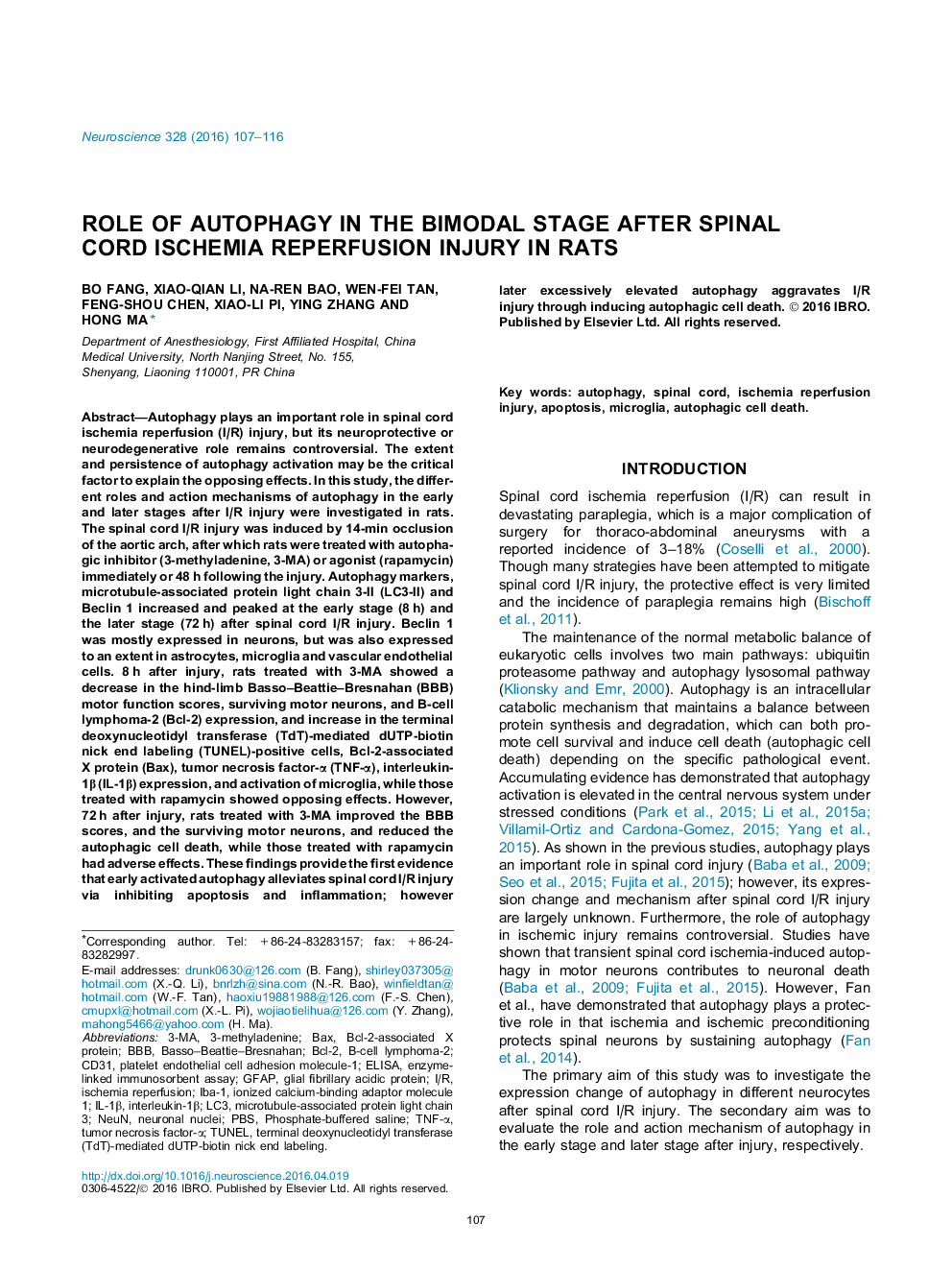| Article ID | Journal | Published Year | Pages | File Type |
|---|---|---|---|---|
| 6271126 | Neuroscience | 2016 | 10 Pages |
Abstract
Autophagy plays an important role in spinal cord ischemia reperfusion (I/R) injury, but its neuroprotective or neurodegenerative role remains controversial. The extent and persistence of autophagy activation may be the critical factor to explain the opposing effects. In this study, the different roles and action mechanisms of autophagy in the early and later stages after I/R injury were investigated in rats. The spinal cord I/R injury was induced by 14-min occlusion of the aortic arch, after which rats were treated with autophagic inhibitor (3-methyladenine, 3-MA) or agonist (rapamycin) immediately or 48 h following the injury. Autophagy markers, microtubule-associated protein light chain 3-II (LC3-II) and Beclin 1 increased and peaked at the early stage (8 h) and the later stage (72 h) after spinal cord I/R injury. Beclin 1 was mostly expressed in neurons, but was also expressed to an extent in astrocytes, microglia and vascular endothelial cells. 8 h after injury, rats treated with 3-MA showed a decrease in the hind-limb Basso-Beattie-Bresnahan (BBB) motor function scores, surviving motor neurons, and B-cell lymphoma-2 (Bcl-2) expression, and increase in the terminal deoxynucleotidyl transferase (TdT)-mediated dUTP-biotin nick end labeling (TUNEL)-positive cells, Bcl-2-associated X protein (Bax), tumor necrosis factor-α (TNF-α), interleukin-1β (IL-1β) expression, and activation of microglia, while those treated with rapamycin showed opposing effects. However, 72 h after injury, rats treated with 3-MA improved the BBB scores, and the surviving motor neurons, and reduced the autophagic cell death, while those treated with rapamycin had adverse effects. These findings provide the first evidence that early activated autophagy alleviates spinal cord I/R injury via inhibiting apoptosis and inflammation; however later excessively elevated autophagy aggravates I/R injury through inducing autophagic cell death.
Keywords
NeuNPBSLC3IL-1βCD31GFAP3-MABcl-23-methyladenineI/RIba-1Ischemia reperfusion injuryAutophagyIschemia reperfusionInterleukin-1βBasso–Beattie–BresnahanBaxEnzyme-linked immunosorbent assayELISAtumor necrosis factor-αTUNELApoptosismicrotubule-associated protein light chain 3BBBSpinal cordTNF-αB-cell lymphoma-2Phosphate-buffered salineAutophagic cell deathionized calcium-binding adaptor molecule 1platelet endothelial cell adhesion molecule-1Microglianeuronal nucleiBcl-2-associated X proteinGlial fibrillary acidic protein
Related Topics
Life Sciences
Neuroscience
Neuroscience (General)
Authors
Bo Fang, Xiao-Qian Li, Na-Ren Bao, Wen-Fei Tan, Feng-Shou Chen, Xiao-Li Pi, Ying Zhang, Hong Ma,
